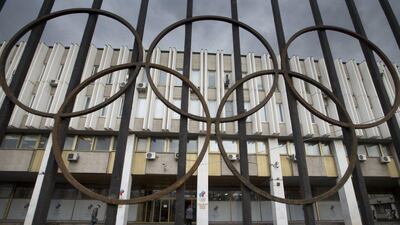A discreet “mouse hole” through a wall, surreptitiously tampered samples using table salt and night-time visits by Russian secret service agents dubbed “the magicians”.
The revelations detailed in a damning 100-page report released Monday, alleging Russian state-run doping at the 2014 Sochi Winter Games and other major sports events, read like a Cold War thriller.
The probe by Canadian law professor Richard McLaren for the World Anti-Doping Agency (Wada) found that the FSB, the successor to the notorious KGB, helped “the state-dictated fail-safe system” carried out under the Moscow sports ministry and covering 30 sports.
Homing in on the Sochi Games – President Valdimir Putin’s chance to show the world that Russia was a sporting great just like in old Soviet times – McLaren’s report states: “The FSB was intricately entwined in the scheme to allow Russian athletes to compete while dirty.”
Central to the plan was destroying the supposedly tamper-proof urine samples that would have seen a Russian athlete caught doping and swapping them for clean ones.
The ploy involved a “clean urine bank” that was full of Russian competitors’ samples and later secretly transported by the FSB from Moscow to an FSB building located handily next to the Sochi Olympic testing laboratory, the report said.
“The bank of clean urine sat in storage awaiting the swapping programme at Sochi when required.”
More from Russian doping scandal
• Wada calls for complete Russia ban from Olympics after probe finds state-run doping
• Stakes high as Russia doping report could trigger 'nuclear option' of full ban
• Russia's Darya Klishina cleared to compete as 'neutral' athlete at Rio Olympics
The report said it had credible evidence from Moscow’s former anti-doping laboratory director, Grigory Rodchenkov, about what happened next. His allegations sparked the investigation. Rodchenkov is now in hiding in the United States and wanted by Russian authorities. According to him, samples provided by athletes would pass through the “mouse hole” around midnight inside the supposedly secure Sochi laboratory into an adjacent “operations” room outside the secure perimeter.
From there, an FSB agent disguised as a sewer engineer who had security clearance to enter the laboratory stepped in. The agent would dispose of the dirty urine and replace it with a clean sample taken from the FSB freezer next door, the caps and stoppers screwed back into place, before returning it back through the hole for testing the next morning, what the report dubbed a “quaint solution.”
Rodchenkov’s role included manipulating the substituted sample, including by using salt, so the ruse would not come to light.
“The Sochi sample swapping methodology was a unique situation, required because of the presence of the international community in the laboratory,” the report said, adding that forensic examinations confirmed sample bottles had been tampered with. “It enabled Russian athletes to compete dirty while enjoying certainty that their anti-doping samples would be reported clean.”
No Russians were caught doping in Sochi.
The investigation also alleged how, as part of the wider subterfuge, thousands of dirty samples were hastily destroyed to avoid detection. Rodchenkov also held an urgent meeting with deputy sports minister Yury Nagornykh, accused of being central to the Sochi cover-up, over athletes whose samples were “potentially a problem if another accredited laboratory were to analyse them”.
“The upshot of that meeting was that deputy minister Nagornykh resolved to call in the ‘magicians’,” the report said. “That night the FSB visited the laboratory and the next day samples were in the laboratory without their caps.”
Follow us on Twitter @NatSportUAE
Like us on Facebook at facebook.com/TheNationalSport

